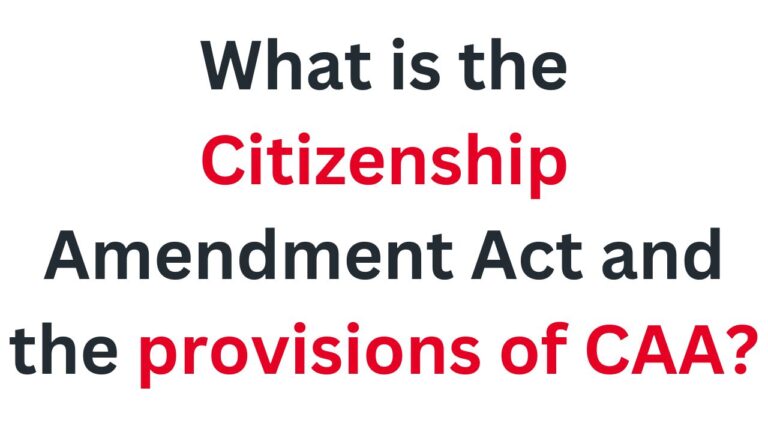**CAA: What is the Citizenship Amendment Act and its Provisions? When was the Law Passed by Parliament? What’s Next?**
The Citizenship Amendment Act (CAA) has been implemented in the country. The new law allows minorities from Pakistan, Bangladesh, and Afghanistan – Hindus, Sikhs, Jains, Buddhists, Parsis, and Christians – to become Indian citizens.
Thank you for reading this post, don't forget to subscribe!**What is the Citizenship Amendment Act and the provisions of CAA?**
The Citizenship Amendment Act (CAA) came into effect in the country on Monday. The notification regarding the law has been issued. The Citizenship Amendment Bill 2019 was passed by Parliament. Later, the bill received the President’s approval.
Through CAA, minorities from Pakistan, Bangladesh, and Afghanistan will find it easier to acquire Indian citizenship.
**What is the Citizenship Amendment Act?**
The Citizenship Amendment Act amends the Citizenship Act of 1955 to make illegal immigrants from Afghanistan, Bangladesh, and Pakistan eligible for citizenship. The Citizenship Amendment Bill was introduced in the Lok Sabha on December 9, 2019. The bill was passed in the Lok Sabha on the same day. On December 11, 2019, the bill was passed in the Rajya Sabha.
**What are the provisions of the new law?**
The Citizenship Act provides for citizenship by naturalization. The applicant must have resided in India during the 12 months immediately preceding the application and for 11 of the 14 years preceding the 12 months. The law extends the period from 11 years to 6 years for individuals from six religions (Hindu, Sikh, Jain, Buddhist, Parsi, and Christian) and three countries (Afghanistan, Bangladesh, and Pakistan).
The law also provides for the cancellation of Overseas Citizen of India (OCI) registration if any rule is violated.
**What are the key points of the law?**
The Citizenship Act of 1955 explains who can obtain Indian citizenship and on what basis. A person can become an Indian citizen if they are born in India or if their parents are Indian or have been residing in the country for some time, etc. However, illegal immigrants are prohibited from obtaining Indian citizenship. An illegal immigrant is a foreigner who: (i) enters the country without valid travel documents such as passports and visas, or (ii) enters with valid documents but stays beyond the permitted time period.
The Foreigners Act, 1946, and the Passport (Entry into India) Act, 1920, empower the central government to regulate the entry, exit, and residence of foreigners in India. In 2015 and 2016, the central government issued two notifications exempting some groups of illegal immigrants from the provisions of the 1946 and 1920 Acts. These groups include Hindus, Sikhs, Buddhists, Jains, Parsis, and Christians from Afghanistan, Bangladesh, and Pakistan who arrived in India on or before December 31, 2014. This means that these groups of illegal immigrants will not be deported.
**What will happen next?**
The Citizenship (Amendment) Act, 2019, is a law that grants Indian citizenship to persecuted religious minorities from neighboring countries. There were many misconceptions about the Citizenship Amendment Act. This is a law to grant citizenship, and no Indian citizen will lose their citizenship under CAA, regardless of their religion. This law is only for those people who have suffered for years and have no place in the world except India.
Due to Corona, there was a delay in implementing the Citizenship Amendment Act. But now it has been implemented. The BJP had committed to implementing the Citizenship Amendment Bill in its 2019 Lok Sabha election manifesto to protect persecuted religious minorities from neighboring countries.
